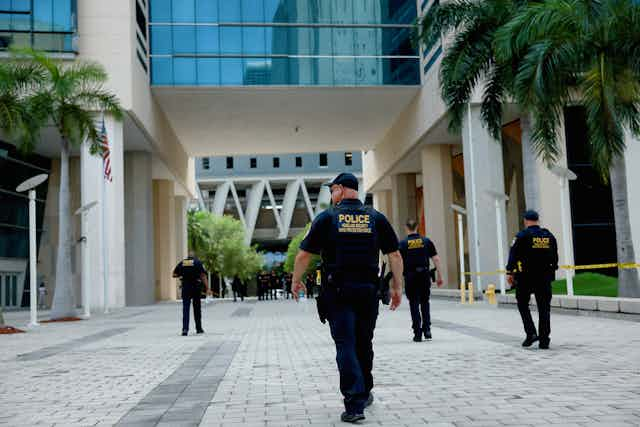Special Counsel Jack Smith may have wished he could indict and try former president Donald Trump in Washington, D.C., where Trump is disliked, rather than in southern Florida, where Trump is popular.
But based on my experience as a scholar of criminal law and procedure, as well as my time practicing criminal law, I believe that under the Constitution – and under the circumstances – Smith had little choice but to prosecute Trump in Florida.
The federal prosecution of Trump for retaining and concealing government documents is specifically pending in the Southern District of Florida, where Mar-a-Lago, Trump’s estate and golf club, is located.
Aileen M. Cannon, the federal judge presiding over the case, announced on June 20, 2023, that the trial could begin as soon as Aug. 14.
The Constitution requires that a trial must be “held in the State where the said Crimes shall have been committed” and that a defendant is entitled to an “impartial jury of the State and district wherein the crime shall have been committed.”
This means that the so-called “venue” for a federal prosecution is the district where the alleged crime was committed.
Congress is responsible for drawing district lines in states. In some states, like Massachusetts and North Dakota, the borders of the district are identical to the borders of the state. Other states have more than one federal judicial district; Florida has three. Accordingly, U.S. district judges in Florida hear cases only from part of the state.
It is important for the prosecution to choose the proper venue. When a defendant objects to the venue, a judge may dismiss the case. And if the jury finds that a crime was not actually committed in the district, they are instructed to render a “not guilty” verdict, ending the case permanently.

Across state lines
There are a few issues that complicate the constitutional mandate that a crime should be prosecuted where it was allegedly committed.
One is that a crime may be committed in more than one district.
Methamphetamine may be made in Arizona and sold in New Mexico, for example. A fraud victim may be deceived in Alabama, but yet wire their money to Mississippi. The law does not insist that there is one and only one permissible venue for a federal prosecution.
Instead, the U.S. Code says that a federal offense “may be inquired of and prosecuted in any district in which such offense was begun, continued, or completed.”
Prosecutors are alleging that Trump’s criminal activity took place in both Florida and Washington.
The federal indictment charges Trump with unlawful retention of national defense information, beginning on Jan. 20, 2021. This date was Trump’s last day in office as president, and at which time he was in Washington.
Although Trump, his staff and his boxes of documents later relocated to the Southern District of Florida, this is a classic allegation of a crime which was “begun” in one district even if it “continued” in another.
So, the U.S. District Court for the District of Columbia could have been the place to charge Trump with most of these felony charges.
Other charges
However, Trump and his aide Waltine Nauta are also charged with conspiracy, false statements and other offenses related to hiding their allegedly unlawful retention of government documents.
The government alleges that these offenses began “on or about May 11, 2022.”
From the indictment, it appears that Trump, Nauta and the documents were at Mar-a-Lago around this time.
Trump, through his lawyers, also allegedly gave false statements to government investigators in Florida.
So, for the felony counts that address these particular crimes – as specified in Counts 32 through 38 – the Southern District of Florida appears to be the only proper venue.
Perhaps prosecutors could have made the argument that there was some connection to the District of Columbia and that they should place Trump on trial there.
It may well be, for example, that some of Trump’s lawyers – several are mentioned, but not named, in the indictment – were located, made calls or sent emails to government officials in the District of Columbia as part of the alleged criminal activity.
But if the Justice Department brought Counts 32 through 38 in the District of Columbia, the trial judge might have granted a defense motion to dismiss based on lack of venue, among other potential challenges.

Forum shopping
The Department of Justice could have alternatively brought Counts 1 through 31 in the District of Columbia and then pursued the other felonies in Florida.
However, I believe that would have looked like brazen forum shopping, meaning trying to secure a court that would likely be friendly to the prosecution. It is unusual for the Department of Justice to divide criminal charges that way, and forum shopping is generally discouraged.
Someone retaining national defense-related documents has committed no crime if it was accidental or mistaken. It violates the law only if it was “willful.”
So, all of the felony charges in Trump’s case are connected.
In order to show that Trump wrongfully retained the documents, the government will want to show the jury that Trump and his allies lied and intentionally concealed the items. Accordingly, it makes sense for all of the counts to be tried together.
Trump has pleaded not guilty to the alleged crimes, and the judge probably would agree with prosecutors that the trial should be taking place in Florida. Bringing the charges in any other district might well have delayed or even destroyed the case. And I believe that a potential conviction in the Southern District of Florida would have more public credibility because of Trump’s popularity there.

